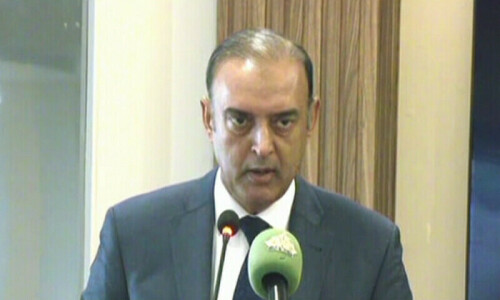THE number of Covid-19 cases across the country are increasing rapidly, with social media posts and news reports reflecting how quickly hospitals are running out of space and how limited healthcare access is. Hospital staff is becoming overwhelmed as more and more medics fall ill and fatalities increase. Confirmed cases in Pakistan are around 130,000 and daily fatalities of nearly 100 are being reported. These figures are of confirmed cases and official hospital deaths, with the actual number of Covid-19 cases including fatalities possibly far higher. In a televised speech, Prime Minister Imran Khan, too, acknowledged how rapidly the virus is spreading and expressed his frustration at how casual the public’s response is. “I am disappointed to see that our nation is being very careless,” he said, adding that many don’t believe that the coronavirus even exists or that people are dying of it. Yet, his strategy to curb and control the spread of the coronavirus is limited to pleas for distancing and observing SOPs.
While the message about distancing and SOPs is the correct one, the government cannot simply leave it to citizens to fend for themselves and then hold them responsible if deaths continue to escalate. The government is ultimately responsible for how badly the coronavirus hits the population and, therefore, must not stop at merely requesting that people take precautions. A mass awareness campaign with effective messaging is the need of the hour, as it is the only way the state can limit the death and doom spelt by the virus in the absence of a lockdown. Unfortunately, while the government’s anti-lockdown policy has been strongly and repeatedly communicated, its anti-coronavirus messaging is weak. If, as the prime minister says, there are so many people who think the virus is a hoax or part of some conspiracy, something is amiss in the government’s existing communications strategy and must be addressed immediately — not when cases rise even further.
They must create a sense of urgency among the population and also have an enforcement mechanism in place for those who don’t follow the rules. As has been said before, the notion of ‘self-responsibility’ and ‘voluntary rule following’ in a country where millions can become infected and thousands die is dangerous. Sweden adopted this approach to avoid long-term economic hardship, but paid a heavy price as its deaths per capita surged to the highest in the world. The support package for healthcare workers and data collection from hospitals are important and necessary government initiatives in this battle, but the war against Covid-19 is a long and difficult one. The government must not stop here. It must invest in improving its messaging and in implementing SOPs. Instead of blaming those who are violating SOPs, the authorities must examine why they have failed to convince the public of the very real consequences of the infection.
Published in Dawn, June 13th, 2020










































